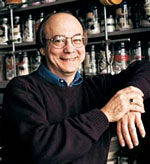|
5. People with HIV/AIDS have a greater chance for survival, thanks to an AIDS drug developed at the U

| U of M researcher Robert Vince developed a series of compounds which led to the new AIDS drug, Ziagen. Over the next decade, the university could collect up to $300 million in royalties from the drug company which sells Ziagen, Glaxo Wellcome.
(Photo courtesy of University of Minnesota)
|
The anti-AIDS drug Ziagen is one of the most promising treatments against the HIV virus. Ziagen, which has been on the market for the past three years, is taken as part of a drug "cocktail," which interferes with the HIV's ability to replicate itself. The compounds which are the basis for Ziagen were developed by Robert Vince, a professor of medicinal chemistry in the College of Pharmacy at the University of Minnesota.
Vince developed the "carbovir" series of antiviral compounds. The first compound was developed in the late 1970s. Its effect on the HIV virus was discovered in 1987 and the university applied for patents beginning in 1988. The drug, abacavir, is sold under the name Ziagen. Its manufacturer, Glaxo-Wellcome, received FDA approval for Ziagen in December, 1998.
Ziagen is in the class of drugs known as "reverse transcriptase inhibitors." Such drugs prevent an enzyme in the HIV virus from converting RNA, the sole genetic material of the virus, into DNA. Without transcribing its RNA into DNA, the virus cannot replicate itself in the human host cell.
Ziagen's claim to fame is based not only on its success in treating HIV, but on its role in a patent dispute between the university and Glaxo-Wellcome that could bring the U up to $300 million in royalties over the next several years.
In 1992, the drug company licensed the technology to develop Ziagen, along with related compounds, from Dr. Vince. The university licensed the patents to Burroughs Wellcome, which later became part of Glaxo Wellcome. In 1998, the university sued Glaxo Wellcome Inc., alleging Glaxo violated the the license agreement, which called for the company to pay the university a 10 percent royalty on sales of Ziagen in the United States. The university alleged that Ziagen was within the series of compounds covered by the patents. The university also alleged that Glaxo would owe a royalty of five percent even if Ziagen itself was not covered by the patents, because Ziagen was manufactured by using a compound that was covered by the patents. Glaxo had argued the licensing agreement did not cover Ziagen specifically, so it was not required to pay royalties.
Under the settlement, Glaxo said it will pay the university a percentage of worldwide sales on a sliding fee scale ranging from 5 percent to 10 percent. Total annual royalties may range from $6 million to more than $30 million, but the $300 million total estimate could vary substantially. The U also received a one-time payment of $7.25 million. The university is using the settlement to create an endowment in the College of Pharmacy for research on new drugs, build a center for such research and create a ``21st Century Endowment'' to match private grants for graduate student fellowships throughout the university.
The settlement is believed by the university to be the second-largest in state history, behind the $6.6 billion settlement last year of the state's lawsuit against the tobacco industry.
|